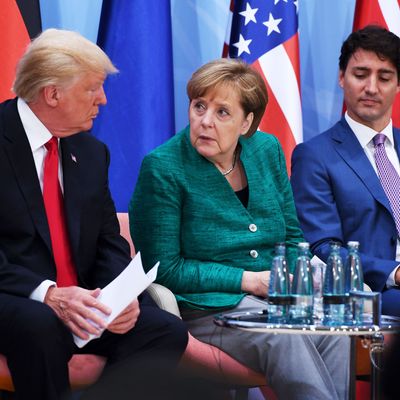
Donald Trump has declared a trade war against America’s core allies – for the sake of “national security.”
On Thursday, the White House announced that it will be imposing a 25 percent tariff on steel imports — and a 10 percent duty on aluminum ones — from the European Union, Canada, and Mexico. The president first unveiled these trade measures in early March, but had initially provided exemptions to the E.U. and America’s northern and southern neighbors. Those exemptions will expire at midnight tonight.
European officials had assumed that Trump would follow through with duties on their exports (negotiations over the Iran deal having already convinced them that trying to dissuade the U.S. president from scoring diplomatic own-goals was a futile enterprise). But Canada and Mexico were reportedly stunned by the move. Our North American allies have been engaged in (what they had believed to be) earnest, productive discussions with the U.S. on reforming NAFTA, and had thus assumed that Washington would not unilaterally impose tariffs on them — let alone that it would so without providing any warning. But on Wednesday night, Canadian and Mexican officials learned of the impending tariffs from news reports, according to one U.S. industry official who spoke with Politico.
The E.U. has promised to meet the American tariffs with retaliatory duties on a wide range of U.S. exports from politically sensitive regions — including bourbon made in Mitch McConnell’s Kentucky and Harley-Davidson motorcycles manufactured in Paul Ryan’s Wisconsin. Mexico has also vowed tit-for-tat tariffs, although it has not publicly disclosed the items that it will target.
Trump’s legal authority for imposing the tariffs rests on the claim that America’s reliance on foreign steel is a threat to its national security. In his public comments on the tariffs, however, the president rarely references this rationale, focusing instead on an economic argument for taking radical measures to reduce America’s trade deficit. Virtually no one believes that the national-security argument holds water, and Canadian foreign minister Chrystia Freeland mocked it in remarks to reporters Wednesday.
“Canada considers it frankly absurd that we would in any way be considered to be a national security threat to the United States,” Freeland said. “I would like to absolutely assure Canadian participants, those who work in steel and aluminum industries, that the government is absolutely prepared to and will defend Canadian industries and Canadian jobs.”
Meanwhile, the president is reportedly mulling a plan to open a new front in his trade war by establishing a “total ban on the imports of German luxury cars.” The legality of that policy would once again rest on the president’s authority to protect national security through unilateral trade actions (ostensibly, one can never be too sure that Angela Merkel isn’t about to conquer the United States with a fleet of autonomous BMWs).






























